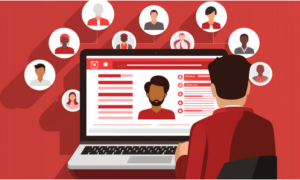Educating for the future skill sets needed at KPMG
- 6 Min Read
Earlier this year, one of my life’s ambitions was fulfilled. I was invited to Number 10. Well, not me personally, not really, although don’t tell my Mum because that’s what she still thinks. KPMG were invited to an employer forum as part of the Government’s review of Education & Funding, and I went as KPMG’s representative.
- Author: Martin Blackburn
- Date published: Dec 6, 2018
- Categories

 Several large UK employers were there to discuss our current skills challenges – shortages, the skills we need for the future, and the extent to which the education system is providing students with what they need to be successful in the current and anticipated landscape. What struck me was that as employers we covered a multitude of sectors – professional services, oil & gas, financial services, engineering – but our future needs were remarkably similar. Not surprisingly, digital skills featured heavily. But the advance of big data meant that the ability to analyse large swathes of information to meaningfully interpret key themes and trends was also high on the priority list. As was the ability to flex, to cope with ambiguity, to anticipate change, and to innovate.
Several large UK employers were there to discuss our current skills challenges – shortages, the skills we need for the future, and the extent to which the education system is providing students with what they need to be successful in the current and anticipated landscape. What struck me was that as employers we covered a multitude of sectors – professional services, oil & gas, financial services, engineering – but our future needs were remarkably similar. Not surprisingly, digital skills featured heavily. But the advance of big data meant that the ability to analyse large swathes of information to meaningfully interpret key themes and trends was also high on the priority list. As was the ability to flex, to cope with ambiguity, to anticipate change, and to innovate.
Fast forward a few months and we’re in the midst of our student recruitment season and I’m wondering to what extent Generation Z are genuinely prepared for the challenges ahead. And the extent to which the generalisations applied to this generation are true.
So what are we told about Gen Z? Typically labelled as Instagram obsessed, unfocused and less resilient than previous generations, employers might be nervous about what the future holds. Whilst personal brand and their online presence is important to Gen Z, I’m not sure this particular label is fair.
Born after 1995, they don’t remember a life before social media, probably haven’t used a landline before (and certainly won’t have had their internet session rudely interrupted by one). It is doubtful they would have sent a fax or experienced the ‘portable’ PC’s I first experienced when training as an auditor in the early 90’s – if you tried to lug those things around today you wouldn’t get as far as the lifts without an intervention from Health and Safety.
But what strikes me most about some of the commentary about Gen Z is how alarming some of it seems. Some research suggests they’re losing their short-term memory – a memory that’s no longer needed given answers can be instantly sourced at the swipe of a screen via Google, Wikipedia or Facebook. Do we really need to be worried if these skills aren’t needed?
“Typically labelled as Instagram obsessed, unfocused and less resilient than previous generations, employers might be nervous about what the future holds. Whilst personal brand and their online presence is important to Gen Z, I’m not sure this particular label is fair.”
So how is this going to pan out? How are myself and those other employers going to find individuals with the skills we are looking for at a time when the pace of change is faster than it’s ever been, but, to quote Justin Trudeau, a pace that will never be this slow again.
In the midst of this year’s student recruitment season, we’re at the heart of that debate, and we will be judging candidates on their own merits rather than taking notice of these numerous stereotypes and assumptions.
With Gen Z comes a new set of skills, and a fresh perspective on our traditional working methods. Just as we discussed at that Employer Forum, it’s safe to say the challenge is on us as business leaders to ensure we create cultures that enable them to thrive.
One generalisation I see played out quite regularly is that Gen Z are a cynical bunch. But if so who could blame them? Hyper aware of ‘fake news’ and deeply skeptical of everything they read on social media, their ability to think critically and independently will be a huge asset to the workplace, and in particular what we do in professional services.
Adapting to new ways of working will no doubt throw up some challenges. At that Employer Forum, we were focused upon what we as employers wanted. But what about what Gen Z want? What we have come to realise is that having a prestigious graduate training scheme and paying well simply isn’t enough to attract every discerning Gen Z applicant. I can’t remember the last time a potential student recruit asked me about salary and benefits.
One of the most effective ways to attract this generation is to show our willingness to embrace and nurture a workforce who won’t be confined to the traditional expectations of the 9 to 5. Gen Z are far more focused upon what our business stands for, our workplace culture, and our long-term progression opportunities. Lip service to “values” and “corporate responsibility” isn’t enough. Just as those employers at No 10 demanded, Gen Z have indeed developed the critical thinking abilities to cut through the hype.
Gen Z is also a strategic group – focused on the long-term and the ‘greater good’. What I’m seeing is that our new generation want a CSR strategy that is meaningful and sustainable, with an ethos that they can get behind. As a firm, KPMG has had all of this in place for a long time, but learning to articulate this level of detail as part of the student offer is a new challenge and I suspect we aren’t alone.
All too often assumptions about this latest generation make the individuals themselves cringe. They are ‘great with technology’, ‘social media savvy’ and “devourers of information”, they’ve all been tarred with the same biased brush. I grew up with a pen and paper but no one ever said the most I had to offer in the workplace was neat handwriting. Except Mrs Buck, my English teacher when I won a Parker Pen for my penmanship skills in my first year of secondary school (thanks again Mrs Buck).
It is clear that each generation has something different to bring to the melting pot of a vibrant workplace culture. The loyalty of the baby boomers, the innovation of the X-ers and the collaborative nature of millennials have all added new and diverse ways of working to the mix. Challenge to the status quo can strengthens a business, if that business is willing to adapt. When it comes to recruitment and retention, providing the best offering to attract Gen Z is driving us to up our game, which can only be a good thing.









